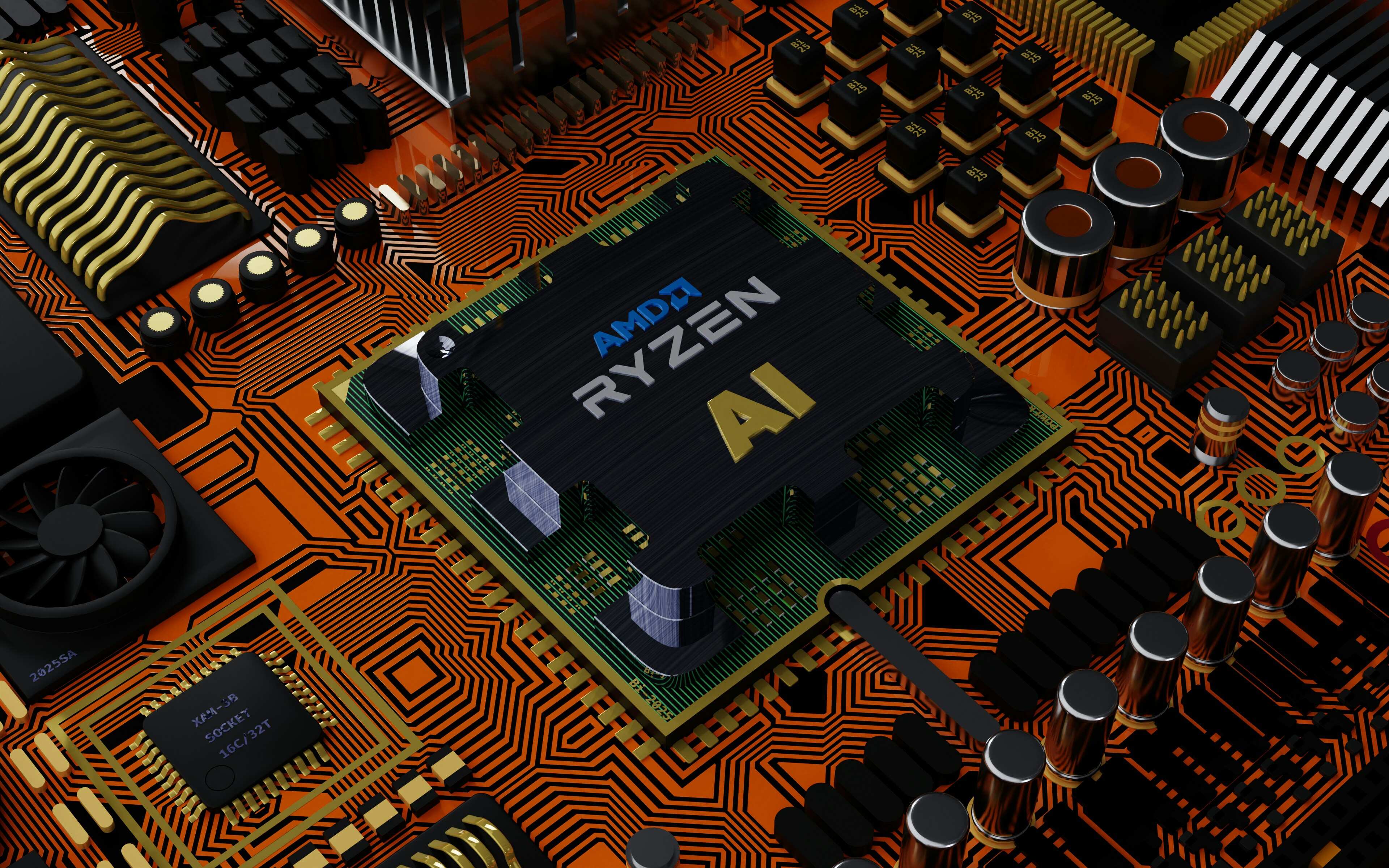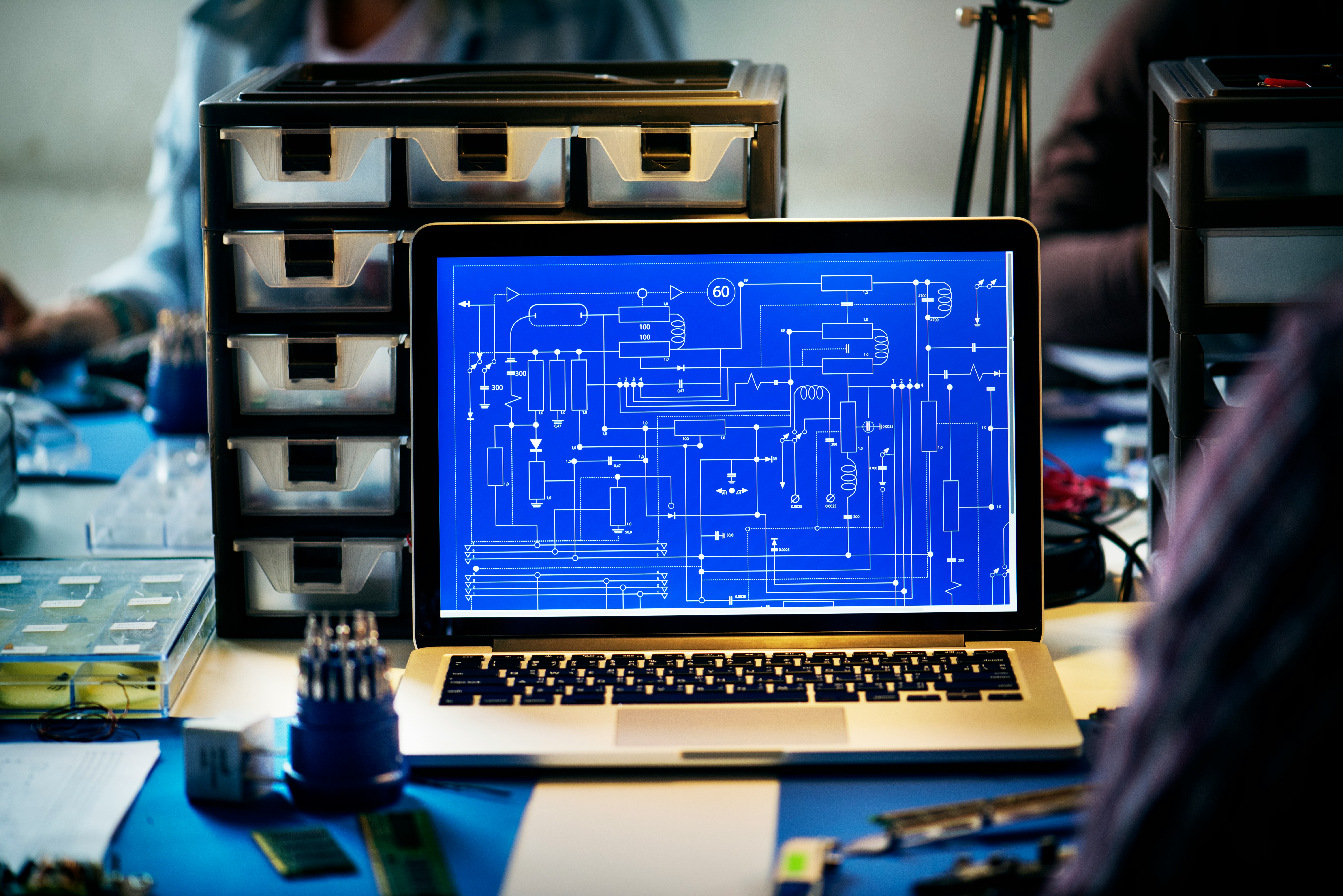AI is undeniably revolutionizing how industries operate, injecting intelligence and efficiency into various sectors. From steering autonomous vehicles to automating industrial processes, AI is transforming embedded systems technology. As we explore the impact of AI on embedded systems, it’s clear that the technology is not just a trend but a huge shift shaping our future.
In this guide, we discover how AI is impacting various industries and the benefits it offers. We will uncover how AI is affecting embedded systems recruitment as we discuss the increased demand for specialized skills, potential job displacement, and new opportunities. We offer insight into how software developers and businesses can adapt to AI advancements to continue to thrive in embedded systems jobs and the wider industry.
The Emergence of AI in Embedded Systems
AI is undoubtedly bringing smarter, more efficient capabilities to a wide range of industries. This technology is particularly transformative in areas like autonomous vehicles, industrial automation, finance, and healthcare.
Let’s explore this in more detail:
What are The Key Sectors Where AI is Making a Difference?
So, which sectors are seeing the biggest impact from AI? Here are a few for you to consider:
- Autonomous Vehicles - AI is the backbone of self-driving technology, helping vehicles navigate and make real-time decisions on the road.
- Industrial Automation - AI is revolutionizing manufacturing and other industrial processes by enhancing automation and predictive maintenance, leading to greater efficiency and reduced downtime.
- Finance - In the finance sector, AI is at the forefront of innovations like fraud detection, automated trading, and offering personalized financial advice, making the industry more secure.
- Healthcare - By supporting everything from diagnostics and patient monitoring to personalized treatment plans, AI is making waves in healthcare by ultimately improving healthcare delivery.
To discover more about the applications of embedded systems across different industries, take a look at our insightful guide - Real-Time Applications of Embedded Systems.
The Benefits of AI Integration on Embedded Systems
With advanced capabilities, many industries are reaping the rewards of AI. What are the particular benefits AI offers? Take a look below:
- Enhanced Efficiency - By taking on repetitive tasks, AI allows systems to operate more smoothly and free up time for more complex work.
- Improved Decision-Making - With AI's ability to analyze data in real-time, decision-making processes become faster and more accurate.
- Personalized Services - AI's capabilities in data analysis mean that services can be customized to individual needs, enhancing customer satisfaction.
- Security - AI enhances security by providing advanced threat detection and response systems, protecting both data and infrastructure.
- Predictive Analysis - With advanced predictive abilities, AI helps businesses anticipate trends and manage resources more effectively, improving efficiency and minimizing faults.
What is AI's Influence on Embedded Systems?
AI is transforming embedded systems development, increasing the need for specialized skills to optimize these technologies within hardware limits. While this enhances system capabilities, it also raises concerns about job displacement due to automation.
However, despite concerns, new job opportunities are also emerging. Let's explore how AI is reshaping job roles in embedded systems and creating new opportunities in the industry:
Demand for Specialized Skills
The rise of AI in embedded systems has sparked huge interest in specialized skills surrounding machine learning. Why? Simply the challenge of making AI work well within limited hardware.
As AI becomes a core component in embedded systems development, engineers need to be skilled in tweaking AI models, managing large data sets, and using AI tools to ensure everything runs smoothly on devices with tight resources. This growing demand for expertise is all about ensuring AI can deliver its full potential without hitting the limits of embedded technology.
So, what are the key skills employers seek in the world of AI and embedded systems engineering?
1. Machine Learning Algorithms
Engineers must implement and optimize machine learning models within embedded systems to enable advanced functionalities like pattern recognition and predictive analytics. Understanding these algorithms ensures that AI can perform efficiently on devices with limited resources.
2. Data Analysis
Proficiency in data analysis is crucial for interpreting the large amounts of data generated by embedded systems. Engineers need these skills to train AI models effectively and extract actionable insights, which are essential for enhancing system performance.
3. AI Frameworks and Tools
Familiarity with AI frameworks such as TensorFlow Lite and PyTorch Mobile is vital for deploying AI models on embedded systems. These tools help optimize AI performance and manage computational constraints, making them ideal for resource-limited environments.
4. Embedded Systems Design
Knowledge of embedded systems design is essential for integrating AI algorithms effectively. Embedded systems engineers must understand hardware constraints and system architecture to support AI functionalities and ensure seamless operation within embedded devices.
5. Optimization Techniques
Skills in optimization techniques are necessary to ensure AI models and algorithms run efficiently on embedded systems. This involves minimizing computational load and memory usage, which is critical for maintaining performance on devices with limited resources.
6. Hardware Integration
Expertise in hardware integration is key for embedding AI into physical devices with tight resources. Embedded systems engineers need to interface sensors, processors, and communication modules with AI algorithms to ensure that the system operates effectively and meets application-specific requirements.
Potential Job Displacement and Transformation
It is no secret that AI is beginning to dominate the tech world. However, there is increasing concern surrounding AI and job loss. For context, AI and machine learning advancements could automate around 30% of jobs globally by the mid-2030s.
Although AI adoption might result in certain job displacements, it also paves the way for significant job creation and transformation. A McKinsey Global Institute study suggests AI could create between 20 million and 50 million new jobs worldwide by as soon as 2030. These new roles are expected to span various industries, including healthcare, technology, finance, and beyond.
Why is there a risk of job displacement?
First, let’s dive deeper into how AI is potentially leading to job displacements:
- Automation of Routine Tasks -AI excels at automating routine tasks, such as data entry and basic customer service inquiries. Embedded systems jobs focused on predictable tasks are at risk, as AI systems can perform them more efficiently and accurately than human workers.
- Cost Efficiency - Organizations may turn to AI to automate embedded systems jobs as a strategy to cut operational costs and improve overall efficiency. By replacing human work with AI, companies can streamline processes and reduce expenses associated with salaries, benefits, and training.
- Rapid Technological Progress - The pace of advancements in AI technology often exceeds the speed at which some job roles can adapt. Rapid evolution can displace embedded systems jobs, particularly those that involve routine or low-skill tasks that AI systems are capable of handling.
How is AI altering embedded system’s jobs and responsibilities?
- Skill Shifts - As we know, there is a growing demand for advanced skills in AI, data science, and machine learning. Workers are now required to have expertise in these areas to stay relevant, as embedded systems jobs increasingly involve working with AI systems, analyzing data, and developing algorithms.
- Role Transformation - Traditional embedded systems jobs are evolving from performing manual tasks to overseeing and managing AI systems. For example, instead of executing routine data processing, employees may focus on configuring AI models, interpreting AI-generated insights, and ensuring the effective integration of AI technologies into existing workflows.
- Emergence of New Roles - The rise of AI is creating entirely new job categories. Embedded systems jobs are emerging that focus on designing AI systems, integrating them into various applications, and addressing ethical concerns related to AI. This includes roles such as AI ethics specialists, system integrators, and performance optimization experts.
New Opportunities in Embedded Systems Recruitment
With AI projected to be a key component in over 50% of embedded systems by 2025, job opportunities are on the rise. There is a demand for new embedded systems jobs across various domains, focusing on designing, optimizing, and maintaining AI-powered embedded systems, all while ensuring they are ethical and secure.
Here's a look at the emerging embedded systems jobs in these areas:
AI System Design and Optimisation
Some examples of emerging roles in AI system design and optimization are as follows:
- AI System Architect - Designs and structures AI systems within embedded environments, balancing hardware and software requirements.
- Machine Learning Engineer - Develops and refines machine learning models to enhance the capabilities of embedded systems.
- Performance Optimization Engineer - Focuses on fine-tuning AI models to ensure they operate efficiently under the hardware constraints typical of embedded systems.
Ethics and Security
Examples of developing roles in AI ethics and security are:
- AI Ethics Specialist - Ensures that AI applications in embedded systems are developed and deployed ethically, addressing issues like bias and fairness.
- Cybersecurity Analyst - Protects AI-enabled embedded systems from security breaches and cyber threats, ensuring data integrity and system reliability.
- Privacy Officer - Manages data privacy and compliance, ensuring that AI systems are in line with legal and ethical standards regarding user data.
AI Integration and Maintenance
As AI integration and maintenance becomes increasingly important, new roles are appearing, including:
- AI Integration Specialist - Responsible for incorporating AI technologies into existing embedded systems, ensuring seamless functionality and performance.
- System Support Engineer - Provides ongoing support and troubleshooting for AI-powered systems, addressing issues as they arise.
- AI Maintenance Technician - Focuses on the upkeep and regular maintenance of AI systems, including software updates and hardware checks to ensure optimal operation.
Adapting to AI Advancements
Based on industry statistics, the global AI in embedded systems market is projected to be valued at $26.2 billion by 2026, with a compound annual growth rate of 18.2%. As the market grows, there is an increased emphasis on the significance of continuous learning to ensure software developers adapt to AI advancements and continue to thrive.
Continuous Learning and Upskilling
The growing sector highlights just how crucial it is for software developers to keep their skills sharp. As AI technologies advance, so too must developers' knowledge. Whether it’s mastering new programming languages, diving into the latest AI frameworks, or understanding emerging trends, ongoing education is key to staying relevant and competitive.
How can businesses implement continuous learning and upskilling initiatives within their team?
- Offer Regular Training Programs - Provide access to workshops, online courses, and certifications that educate on the latest programming languages, AI frameworks, and emerging technologies.
- Encourage Attendance at Industry Conferences - Support team members in attending relevant conferences and seminars to stay knowledgeable on industry trends and network with experts.
- Promote Knowledge Sharing - Create opportunities for team members to share their expertise through internal seminars, webinars, or knowledge-sharing sessions.
- Implement a Learning Management System (LMS) - Use an LMS to track progress, provide resources, and offer personalized learning paths based on individual and team needs.
- Provide Access to Industry Publications - Subscribe to relevant journals, magazines, and online platforms to ensure that your team has access to the latest research and developments in the field.
Networking
It is important not to underestimate the power of a well-connected network. Building a strong professional network not only keeps software developers informed about industry trends but also opens doors to new opportunities. Engaging with peers, attending industry conferences, and participating in relevant online forums can provide valuable insights and connections.
Here’s how businesses can encourage networking among their team:
- Organize Networking Events - Host or sponsor industry meetups, mixers, or company events that encourage team members to connect with peers and industry professionals.
- Support Conference Attendance - Provide financial support or time off for employees to attend industry conferences, seminars, and workshops where they can network and learn.
- Facilitate Online Forum Participation - Encourage participation in relevant online communities, forums, and professional groups to help team members engage with industry trends and network virtually.
- Create Internal Networking Opportunities - Build a culture of networking within the company by organizing regular team-building activities, lunch-and-learns, or cross-departmental projects.
- Leverage Professional Associations - Support membership in professional organizations and associations related to AI and embedded systems, which can offer networking events, resources, and industry connections.
Wrapping Up The Impact of AI on Embedded Systems Recruitment
As AI continues to advance, its impact on embedded systems recruitment and industry practices is profound. The integration of AI drives efficiency, enhances decision-making, and personalizes services across various sectors. This technological shift is creating new opportunities and demands within the job market, from specialized skills in AI and machine learning to emerging roles in ethics and security.
The benefits of AI are significant, offering enhanced efficiency, improved decision-making, and better security. These advancements, however, also raise concerns about job displacement. While some roles may be automated, AI is also creating new job opportunities and altering existing ones, emphasizing the need for continuous learning and adaptation in the workforce.
To stay competitive, professionals and businesses must embrace ongoing education and skill development. By keeping abreast of the latest technologies, participating in industry events, and leveraging networking opportunities, individuals can position themselves for success in the industry.
Linking Global Businesses with Outstanding Tech Talent
Looking for embedded systems jobs? Or aiming to build a stand-out software development team? Partner with our specialized recruitment agency to tap into exclusive industry insights and a vast network of connections.
Our expert consultants excel at matching clients and candidates with embedded systems opportunities that meet their unique needs.
Contact us today to learn how we can support your vision.







